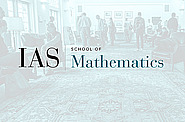Seminars Sorted by Series
Computer Science/Discrete Mathematics Seminar I
Feb
13
2012
Computer Science/Discrete Mathematics Seminar I
High-Confidence Predictions under Adversarial Uncertainty
11:15am|S-101
Feb
20
2012
Computer Science/Discrete Mathematics Seminar I
Lasserre Hierarchy, Higher Eigenvalues, and Graph Partitioning
Venkat Guruswami
11:15am|S-101
Feb
27
2012
Computer Science/Discrete Mathematics Seminar I
An Additive Combinatorics Approach to the Log-Rank Conjecture in Communication Complexity
Noga Zewi
11:15am|S-101
Mar
05
2012
Mar
12
2012
Computer Science/Discrete Mathematics Seminar I
Computational Aspects in the Braid Group and Applications to Cryptography
11:15am|West Bldg. Lecture Hall
Mar
19
2012
Computer Science/Discrete Mathematics Seminar I
Optimal Estimators for Entropy, Support Size, and Related Properties
Gregory Valiant
11:15am|S-101
Mar
26
2012
Computer Science/Discrete Mathematics Seminar I
Hardness of Randomized Truthful Mechanisms for Combinatorial Auctions
11:15am|S-101
Apr
02
2012
Apr
16
2012
Computer Science/Discrete Mathematics Seminar I
Near-Linear Time Approximation Algorithm for Balanced Separator
11:15am|S-101
Apr
23
2012
Apr
30
2012
Computer Science/Discrete Mathematics Seminar I
Randomized Greedy Algorithms for the Maximum Matching Problem with New Analysis
11:15am|S-101
May
07
2012
Computer Science/Discrete Mathematics Seminar I
Topology of Norms Defined by Systems of Linear forms
11:15am|S-101
May
14
2012
Computer Science/Discrete Mathematics Seminar I
Are Lattice Based Cryptosystems Secure Enough?
Nisheeth Vishnoi
11:15am|S-101
May
21
2012
Sep
24
2012
Computer Science/Discrete Mathematics Seminar I
The Computational Complexity of Geometric Topology Problems
Greg Kuperberg
11:15am|S-101
Oct
01
2012
Computer Science/Discrete Mathematics Seminar I
Random Vectors, Random Matrices, Permuted Products, Permanents, and Diagrammatic Fun
Cris Moore
11:15am|S-101
Oct
08
2012
Computer Science/Discrete Mathematics Seminar I
Identity Testing of Tensors, Low Rank Recovery and Compressed Sensing
Amir Shpilka
11:15am|S-101
Oct
15
2012
Computer Science/Discrete Mathematics Seminar I
A Multi-Prover Interactive proof for NEXP Sound Against Entangled Provers
Tsuyoshi Ito
11:15am|S-101
Oct
29
2012
Computer Science/Discrete Mathematics Seminar I
Combinatorial Walrasian Equilibrium
Michal Feldman
11:15am|S-101
Nov
05
2012
Computer Science/Discrete Mathematics Seminar I
Query Complexity of Black-Box Search
Ben Rossman
11:15am|S-101
Nov
19
2012
Computer Science/Discrete Mathematics Seminar I
A Complete Dichotomy Rises from the Capture of Vanishing Signatures
Jin-Yi Cai
11:15am|S-101
Nov
26
2012
Computer Science/Discrete Mathematics Seminar I
Polynomial Identity Testing of Read-Once Oblivious Algebraic Branching Progress
11:15am|S-101
Dec
03
2012
Computer Science/Discrete Mathematics Seminar I
Information Complexity and Exact Communication Bounds
11:15am|S-101
Dec
10
2012
Computer Science/Discrete Mathematics Seminar I
Matching: A New Proof for an Ancient Algorithm
Vijay Vazirani
11:15am|S-101
Jan
14
2013
Jan
21
2013
Computer Science/Discrete Mathematics Seminar I
Clique Number of Random Geometric Graphs in High Dimension
Sebastien Bubeck
11:15am|S-101
Jan
28
2013
Computer Science/Discrete Mathematics Seminar I
New Independent Source Extractors with Exponential Improvement
Xin Li
11:15am|S-101
Feb
04
2013
Computer Science/Discrete Mathematics Seminar I
Influences, Traces, Tribes, and Perhaps Also Thresholds
11:15am|S-101
Feb
11
2013
Computer Science/Discrete Mathematics Seminar I
Mathematical Theories of Interaction with Oracles: Active Property Testing and New Models for Learning Boolean Functions
Liu Yang
11:15am|S-101
Feb
18
2013
Computer Science/Discrete Mathematics Seminar I
Connectedness, Sperner's Lemma and Combinatorial Problems
Penny Haxell
11:15am|S-101
Feb
25
2013
Computer Science/Discrete Mathematics Seminar I
Polar Codes and Randomness Extraction for Structured Sources
11:15am|S-101
Mar
04
2013
Mar
11
2013
Computer Science/Discrete Mathematics Seminar I
Intractability in Algorithmic Game Theory
Tim Roughgarden
11:15am|S-101
Mar
18
2013
Computer Science/Discrete Mathematics Seminar I
Constant Rate PCPs for Circuit-SAT with Sublinear Query Complexity
11:15am|S-101
Mar
25
2013
Computer Science/Discrete Mathematics Seminar I
New Locally Decodable Codes from Lifting
Madhu Sudan
11:15am|S-101
Apr
01
2013
Computer Science/Discrete Mathematics Seminar I
Device Independence: A New Paradigm for Randomness Manipulation?
Thomas Vidick
11:15am|S-101
Apr
15
2013
Computer Science/Discrete Mathematics Seminar I
Analytical Approach to Parallel Repetition
Irit Dinur
11:15am|S-101
Apr
22
2013
Computer Science/Discrete Mathematics Seminar I
Diffuse Decompositions of Polynomials
Daniel Kane
11:15am|S-101
Apr
29
2013
Computer Science/Discrete Mathematics Seminar I
Cryptography and Preventing Collusion in Second Price (Vickery) Auctions
Michael Rabin
11:15am|S-101
May
06
2013
Computer Science/Discrete Mathematics Seminar I
Tight Bounds for Set Disjointness in the Message-Passing Model
Rotem Oshman
11:15am|S-101
May
13
2013
Computer Science/Discrete Mathematics Seminar I
Nondeterministic Direct Product Reductions and the Success Probability of SAT Solvers
10:30am|S-101
May
13
2013
Computer Science/Discrete Mathematics Seminar I
Association Schemes, Non-Commutative Polynomials and Lasserre Lower Bounds for Planted Clique
1:30pm|S-101
Sep
23
2013
Computer Science/Discrete Mathematics Seminar I
Using the DFS Algorithm for Finding Long Paths in Random and Pseudo-Random Graphs
11:15am|S-101
Sep
30
2013
Oct
07
2013
Computer Science/Discrete Mathematics Seminar I
Stanley-Wilf limits are typically exponential
Jacob Fox
11:15am|S-101
Oct
14
2013
Computer Science/Discrete Mathematics Seminar I
Obfuscating Programs Against Algebraic Attacks
Yael Tauman-Kalai
11:15am|S-101

